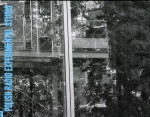 PRES Revisited: Józef Patkowski in Memorium
PRES Revisited: Józef Patkowski in Memorium
Various Artists
Bolt Records DUX 0812/13 www.boltrecords.pl
Fascinating in its bravado, this set joins one CD of 1960s and 1970s recordings of important musique concrète by five Polish composers with another CD of acoustic improvisations on these themes by three British and two Polish players. The result not only captures cerebral variants of the compositions but also affirms the originality of the sounds created in the days of bulky tape recorders and thick coaxial cables.
Honouring Józef Patkowski (1929-2005), co-founder of the Polish Radio Experimental Studio (PRES) in 1957 and its director for 28 years, the original recordings revisit the musical freedom offered by PRES during those Cold War years. For instance Krzysztof Penderecki’s Psalmus (1961) uses electronic filtering and flanges to deconstruct vowels and consonants initially created by the bel canto gurgles and quivering yodels of male and female singers. John Tilbury’s contemporary piano version is more chromatic, with vibrating and strumming strings resonating on top of basso keyboard rumbles. After the tune reaches satisfactory linearity, he shatters the mood by shrilling a lifeguard’s whistle.
Or compare Eugeniusz Rudnik’s 1967 recording of his Dixi with cellist Mikolaj Palosz’s reimagining of it four decades later. Originally a tape collage, the performance swells to forte as dissonant, processed delays almost visually pulsate then dissolves in gradually less audible undulations. Taking an opposite approach, Palosz’s variant mixes strident, spiccato string squeaks at different tempos, reaching raucous volume that sound as if the strings are being splintered as he plays and concluding with string popping fading into dissolving shrills.
Appropriately the final track is a Hommage to Bogusław Schaeffer’s Symphony. Here Tilbury, Palosz, violinist Phil Durrant, guitarist Maciej Śledziecki and percussionist Eddie Prévost combine to coalesce stretched string glissandi, snare ratcheting and cymbal clangs plus faux-romantic piano chording into an ever-shifting performance, which like the Polish composer’s work is both aleatory and multiphonic.



